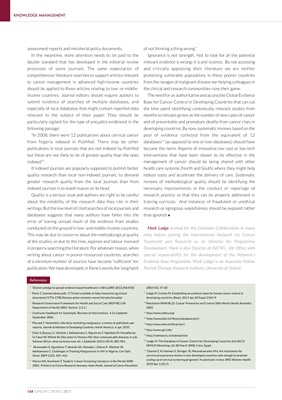
KNOWLEDGE MANAGEMENT
assessment reports and ministerial policy documents. of not thinking a thing wrong”.
In the meantime, more attention needs to be paid to the Ignorance is not strength. Not to look for all the potential
double standard that has developed in the editorial review relevant evidence is wrong; it is anti-science. By not accessing
processes of some journals. The same expectation of and critically appraising their literature we are neither
comprehensive literature searches to support articles relevant protecting vulnerable populations in these poorer countries
to cancer management in advanced high-income countries from the ravages of malignant disease nor helping colleagues in
should be applied to those articles relating to low- or middle- the clinical and research communities raise their game.
income countries. Journal editors should require authors to The need for an authoritative and accessible Global Evidence
submit evidence of searches of multiple databases, and Base for Cancer Control in Developing Countries that can cut
especially of local databases that might contain reported data the time spent identifying contextually relevant studies from
relevant to the subject of their paper. They should be months to minutes grows as the number of new cases of cancer
particularly vigilant for the type of prejudice evidenced in the and of preventable and premature deaths from cancer rises in
following passage: developing countries. By now, systematic reviews based on the
“In 2008, there were 12 publications about cervical cancer pool of evidence collected from the equivalent of 12
from Nigeria indexed in PubMed. There may be other databases16 (as opposed to one or two databases) should have
publications in local journals that are not indexed by PubMed become the norm. Reports of innovative low cost or low tech
but these are not likely to be of greater quality than the ones interventions that have been shown to be effective in the
indexed.”6 management of cancer should be being shared with other
If indexed journals are popularly supposed to publish better health care systems (North and South) where they might help
quality research than local non-indexed journals, to demand reduce costs and accelerate the delivery of care. Systematic
greater research quality from the local journals than from reviews of methodological quality should be identifying the
indexed journals is to stand reason on its head. necessary improvements in the conduct or reportage of
Quality is a serious issue and authors are right to be careful research practice so that they can be properly addressed in
about the reliability of the research data they cite in their training curricula. And instances of fraudulent or unethical
writings. But the low level of cited searches of local journals and research or egregious wastefulness should be exposed rather
databases suggests that many authors have fallen into the than ignored. l
error of leaving unread much of the evidence from studies
conducted on the ground in low- and middle-income countries. Mark Lodge worked for the Cochrane Collaboration in many
This may be due to concerns about the methodological quality roles before joining the International Network for Cancer
of the studies, or due to the time, expense and labour involved Treatment and Research as its Director for Programme
in properly searching the literature. For whatever reason, when Development. Mark is also Director of INCTR’s UK Office with
writing about cancer in poorer-resourced countries, searches special responsibility for the development of the Network’s
of a minimum number of sources have become “sufficient” for Evidence Base Programme. Mark Lodge is an Associate Fellow,
publication. We have developed, in Paine’s words the ‘long habit Particle Therapy Research Institute, University of Oxford.
References
1.
‘Doctors pledge to spread evidence based healthcare in Africa BMJ 2013;346:f356’ 2003 4(1): 57-60
2. 9.
Paine T, Common Sense publ. 1776 text available at http://www.let.rug.nl/usa/ Lodge M, Corbex M. Establishing an evidence-base for breast cancer control in
documents/1776-1785/thomas-paine-common-sense/introduction.php) developing countries. Breast. 2011 Apr;20 Suppl 2:S65-9.
3. 10.
Research Governance Framework for Health and Social Care (RGFHSC) UK Resolution WHA58.22: Cancer Prevention and Control 58th World Health Assembly
Department of Health 2005 Section 2.3.1 ) 2005
4. 11.
Cochrane Handbook for Systematic Reviews of Interventions 4.2.6 Updated http://www.cebha.org/
September 2006 12.
http://www.who.int/library/databases/en/)
5.
Pilsczek F. Helminthic infections mimicking malignancy: a review of published case 13.
http://www.who.int/hinari/en/)
reports. Journal of Infection in Developing Countries, North America, 4, apr. 2010
14.
http://www.ajol.info/
6.
Dalal S, Beunza JJ, Volmink J, Adebamowo C, Bajunirwe F, Njelekela M, Mozaffarian
15.
http://indmed.nic.in/indmed.html
D, Fawzi W, Willett W, Olov dami H, Holmes MD. Non-communicable diseases in sub-
16.
Saharan Africa: what we know now. Int. J. Epidemiol. (2011) 40 (4): 885-901. Lodge M The Database of Cancer Control for Developing Countries 2nd ASCO-
7. SEMCO Workshop. 26-28 March 2008, Cairo, Egypt
Akinwande O, Ogundiran T, Akarolo SA, Mamadu I, Dakum P, Blattner W,
17.
Adebamowo C. Challenges in Treating Malignancies in HIV in Nigeria. Curr Opin Chamot E, Kristensen S, Stringer JS, Mwanahamuntu MH. Are treatments for
Oncol. 2009 21(5): 455–461. cervical precancerous lesions in less-developed countries safe enough to promote
8. scaling-up of cervical screening programs? A systematic review. BMC Womens Health.
Moore MA, Kunimoto T, Tsuda H. Cancer Screening Literature in the Period 2000-
2010 Apr 1;10:11.
2002 : Pointers to Future Research Avenues. Asian Pacific Journal of Cancer Prevention
154 CANCER CONTROL 2013